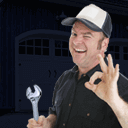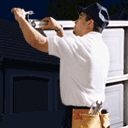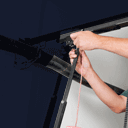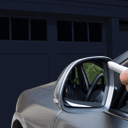Door closure problems
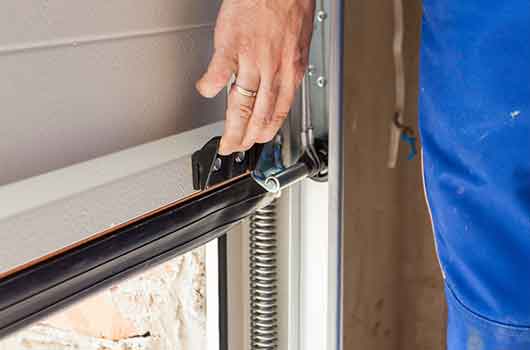 One of the most common (and aggravating!) problems with garage doors is when they won’t close. Think about it; you are leaving for work and your mind is on that all-important presentation you are making for your boss’s investors. You’ve put the finishing touches on your talk, materials and wardrobe. You are even leaving a bit early to set up before the others get there. As you back out of your garage, you notice that the door started to close and then suddenly, it went back up! Or, you push the close button on the remote and NOTHING happens! It opened just fine; but now it won’t close! You try again and get the same results! Your garage door picked the WRONG time to start acting up but actually, there is no good time for it to do so!
One of the most common (and aggravating!) problems with garage doors is when they won’t close. Think about it; you are leaving for work and your mind is on that all-important presentation you are making for your boss’s investors. You’ve put the finishing touches on your talk, materials and wardrobe. You are even leaving a bit early to set up before the others get there. As you back out of your garage, you notice that the door started to close and then suddenly, it went back up! Or, you push the close button on the remote and NOTHING happens! It opened just fine; but now it won’t close! You try again and get the same results! Your garage door picked the WRONG time to start acting up but actually, there is no good time for it to do so!
The Main Culprits
Centennial Garage Door Repair offers these tips on handling garage door closure problems. Usually, the problem is 1) the garage door encounters resistance and 2) the sensor beam is interrupted.
Doing a few simple checks on these can often save you lots of time and money over having a garage door repair expert come to your property and make the adjustments himself.
Resistance is futile!
No, your garage door has nothing to do with Star Trek but encountering resistance CAN prevent your garage door from closing properly. Try this exercise to test it. First, with your garage door closed, pull the emergency release latch (the red handle) and disconnect your garage door from the opener. Now, try and lift your garage door manually. Was it fairly easy to open or did you encounter medium or heavy resistance? If your garage door lifts normally, the problem is most likely your safety eye alignment or your sensor beam. We’ll get to that in a minute! If you did feel resistance, then the problem could be a damaged spring, a broken wheel or a bent track. These items are easy to fix and not expensive, but you should call a professional to do the work. There are many full service garage door repair shops in Centennial, CO that can provide this help, so call one that you know and trust, or give our friendly crew at Centennial Garage Repair Services a call and we’ll be happy to offer our expertise to make everything right.
Sensor alignment
One of the most common reasons for garage door closing malfunctions is your sensor alignment. First, check to make sure that one light is always shining. This one is your transmitter. The other one is the receiver and it should light up when the view to your transmitter is clear and unobstructed. If one of the sensors is bumped and moved even slightly out of alignment, the signal can be disrupted. Try bending it back so that they have a clear view of each other again.
Sometimes, the sensors can be aligned perfectly but something is blocking the signal. Remember; garages are usually full of items like cars, ATV’s, bicycles, brooms, rakes, shovels, garden equipment, dog food bags, trash cans, boxes, skateboards, tools, hand drills, leaf blowers, storage containers and lots more. Anyone of these can fall, be nudged, or be positioned so that the light from the transmitter is NOT received by the receiver. Also, items that are sharp can cut or fray the wires to the safety eyes. Bugs and animals can damage the wires and the end result is the same; sporadic garage door working ability. This is due to the fluctuations of the current through the damaged wires. Sometimes they work and often, they don’t. Even if you were to splice and tape the damaged wires together, moisture and humidity can enter and cause the safety override to trigger.
Faulty wiring
Many times, the sensors offer sporadic performance due to faulty wiring. The wires could have been chewed on, nudged, partially cut or accidentally pulled, but if they are not connected properly, your safety override can be triggered causing your garage door to start back up again or not come back down at all.
Dirty sensors
Having dirty safety eye sensors is much like trying to see out of dirty glasses; it doesn’t work! If it does, it’s not too reliable. You can clean the sensor but do it carefully – they scratch easily so use a cloth to wipe them clean and it’s ok to use a cleanser, but try and make it a streak free one. Remember, these small sensors are made of glass and you don’t want to scratch or crack them in any way.
Track build-up
Another reason that your garage door may not close properly is that there is build-up material in your tracks like dirt, small rocks, mud, lint, gum or other debris. It may not be obvious but even a little of this can cause your garage door to start to close, and then go back up on its own. This is due to the inability of the rollers to move forward on the tracks as they are designed to NOT crush or roll over anything lodged in the tracks; instead they retract. Clean tracks periodically to ensure that the rollers can move through them.
Cables and tension springs
Your tension springs and cables are designed to SLOWLY and SAFELY lower your garage door when you want to close it. Can you imagine not having them and pushing the close button that results in a falling or rapidly descending door? NOT a good idea! This is what happens when the cables or springs break or snap. Your door can drop suddenly and crash to the ground with a loud BANG! When your springs break, it puts tremendous pressure on your cables and they usually snap too causing your garage door to fall down fast! Don’t try to fix these! Professional service is always recommended and here in Centennial, CO there are many full service garage door repair shops that are both affordable and fast responding.
Garage Door Articles
- Door closure problems
- Cold Weather Problems With Garage Doors
- Why A Garage Door Won't Stay Open – And What To Do
- Having Garage Door Troubles? Here’s What to do
- Garage Door Won’t Open or Close with Remote Control
- Identifying Garage Door Spring Issues
- The best ways to extend the life of your Garage Door
- Garage Door won’t open or close with remote control
- Why You’re Garage Door Might Not Open
- Garage Door Maintenance
- How to Find a Good Garage Door Service





